A Detailed Guide to Conducting Criminal Background Checks in Iowa
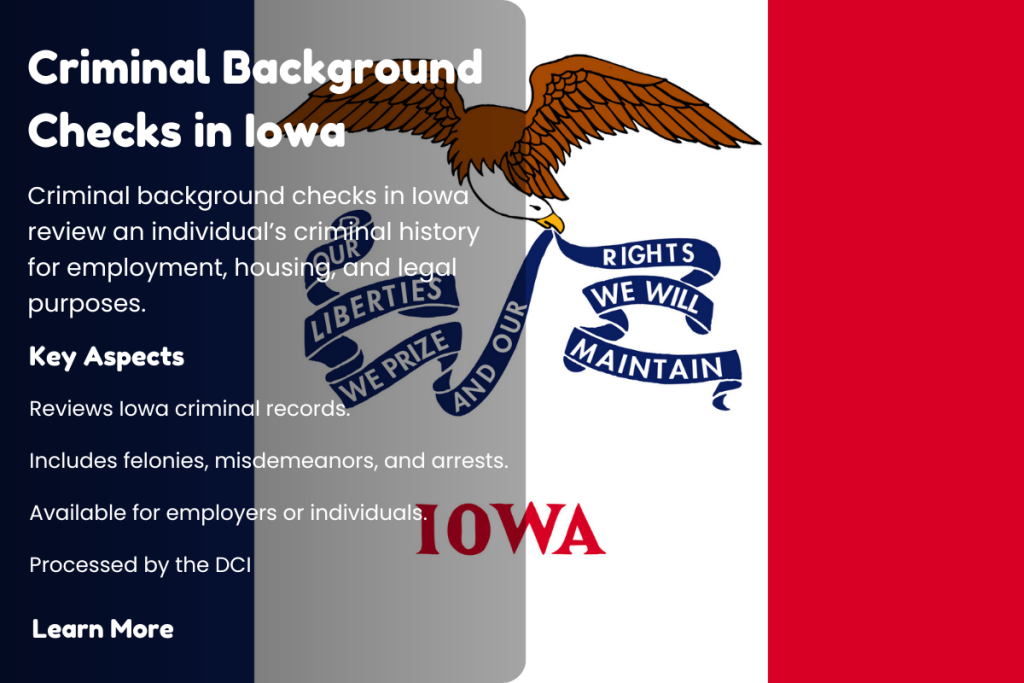
Understanding Criminal Background Checks in Iowa
A criminal background check in Iowa is a vital tool for ensuring public safety, maintaining transparency, and making informed decisions. These checks offer a detailed history of an individual’s interactions with the legal system, making them indispensable for employers, landlords, and organizations across various sectors. By accessing accurate and comprehensive records, decision-makers can mitigate risks, uphold safety standards, and foster trust within their communities.
Defining Criminal Background Checks in Iowa
Criminal background checks in Iowa involve reviewing an individual’s legal history to determine their suitability for specific roles or responsibilities. These records typically include arrests, convictions, warrants, and outcomes of court cases. They are commonly used in employment screening, tenant evaluations, volunteer assessments, and licensing processes.
Employers use these checks to ensure the safety of their workforce and to comply with industry regulations. Landlords rely on them to make informed decisions about potential tenants, while educational and volunteer organizations use them to safeguard vulnerable populations. This process ensures that individuals entrusted with sensitive roles or responsibilities meet the required ethical and safety standards.
Why Criminal Background Checks Matter
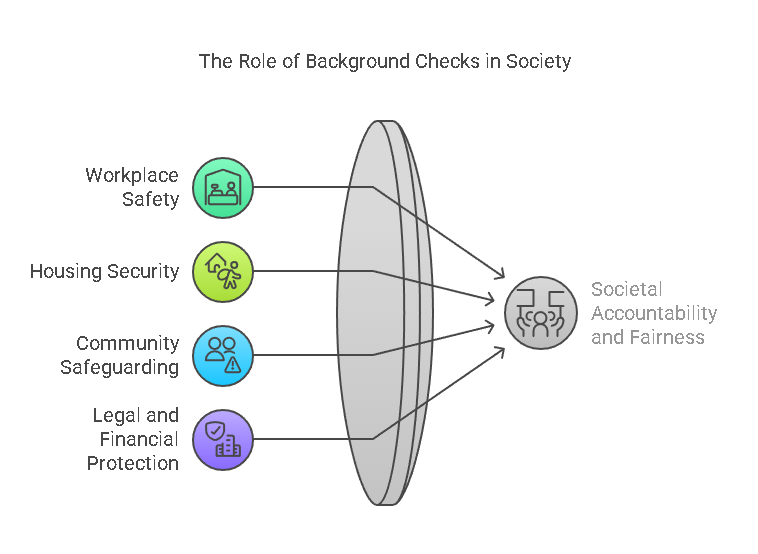
The importance of conducting criminal background checks cannot be overstated. Their relevance spans several critical areas:
- Workplace Safety and Compliance
In industries like healthcare, education, and childcare, criminal background checks are often legally mandated to ensure that employees meet regulatory and ethical standards. These checks help identify candidates with a history of violence or misconduct, minimizing risks to colleagues and clients. - Housing Security
Landlords use these checks to evaluate prospective tenants, ensuring they can protect their properties and maintain safe living environments. For instance, a history of property damage or criminal activity may disqualify an applicant from renting. - Safeguarding Communities
Organizations that rely on volunteers, such as schools or community programs, use background checks to prevent individuals with potentially harmful intentions from gaining access to vulnerable populations. - Legal and Financial Protection
By conducting thorough screenings, employers and landlords can reduce liabilities, prevent legal disputes, and protect their reputations.
Criminal background checks benefit not only the individuals and organizations conducting them but also society at large, fostering accountability and fairness.
What Criminal Background Checks Reveal
A typical criminal background check in Iowa includes several types of records that provide a comprehensive view of an individual’s legal history:
- Arrests and Convictions
Information on arrests, charges, and convictions, including details about the nature of the offense, sentencing, and any legal proceedings. - Active Warrants
Records of outstanding warrants that may indicate unresolved legal issues. - Court Records
A detailed account of trials, plea agreements, dismissals, and verdicts. - Incarceration and Parole Records
Information on imprisonment, parole, and probation, which provides insight into an individual’s interactions with the correctional system.
This data is critical for making informed decisions, whether hiring an employee, renting out property, or assessing a volunteer applicant.
How Criminal Background Checks Are Conducted in Iowa
The process for conducting criminal background checks in Iowa involves specific steps and the involvement of official state agencies, particularly the Iowa Department of Public Safety and the Division of Criminal Investigation (DCI).
- Submitting a Request
Requests for background checks can be made by individuals or organizations. These requests typically require identifying information, such as the individual’s full name, date of birth, and, in some cases, Social Security Number. - Consent and Authorization
Most checks require the individual’s consent, ensuring compliance with ethical and legal standards. Employers, for example, must obtain written authorization before accessing an applicant’s criminal history. - Record Compilation
The DCI gathers data from various state and local sources, compiling a comprehensive report of the individual’s criminal history. Certain records, such as sealed or expunged cases, may not appear in standard reports. - Report Delivery
Depending on the complexity of the request, processing times may vary. Standard checks are often completed within a few business days, while more detailed reports may take longer.
This process ensures that relevant records are accessed efficiently, though certain challenges can arise, such as delays or incomplete data.
Challenges in Conducting Background Checks
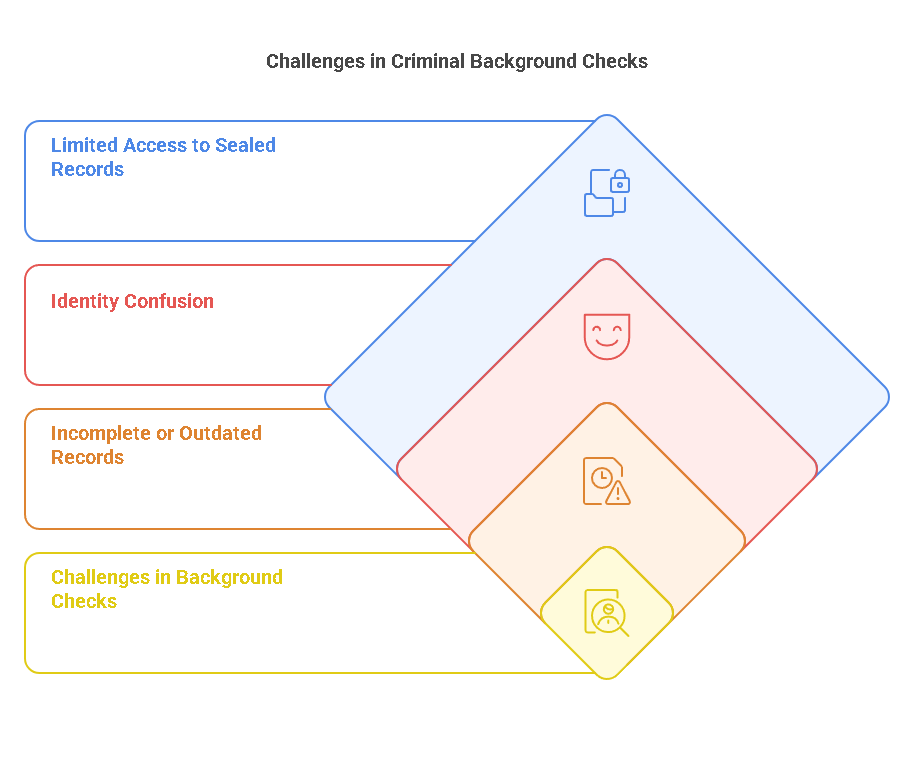
While criminal background checks are an invaluable resource, they are not without their challenges. Common issues include:
- Incomplete or Outdated Records
Delays in updating criminal databases can result in missing or inaccurate information, potentially leading to flawed decisions. - Identity Confusion
Errors such as name similarities or incorrect details can cause misidentification, leading to the inclusion of irrelevant records. - Limited Access to Sealed Records
Certain criminal records, such as those expunged or sealed by court order, may not be available for standard checks. This can limit the scope of the information obtained. - Complexity in Disputing Errors
Correcting inaccuracies in criminal background checks often requires navigating a complex system of legal and administrative processes, which can be time-consuming and frustrating.
Awareness of these challenges can help individuals and organizations take proactive measures, such as double-checking information or utilizing reliable third-party services, to ensure the accuracy and reliability of background checks.
Conducting And Correcting Criminal Background Checks In Iowa
Criminal background checks in Iowa are an essential tool for decision-making across employment, housing, and other sensitive areas. Conducting and correcting these checks requires a detailed understanding of the processes and compliance requirements involved. This section focuses on obtaining, correcting, and ensuring the accuracy of criminal background checks while emphasizing compliance with Iowa laws and federal regulations.
How To Obtain A Criminal Background Check In Iowa
The Iowa Division of Criminal Investigation (DCI) serves as the primary agency for processing criminal background checks within the state. Whether you’re an employer, landlord, or individual, the process is straightforward but requires adherence to specific guidelines.
- Eligibility And Consent Requirements
Only authorized individuals or entities can request a background check. Employers and landlords must secure the subject’s written consent before initiating the process, ensuring compliance with the Fair Credit Reporting Act (FCRA). - Submission Of Application
Requests for background checks can be made online, in person, or by mail. Applicants must provide identifying details such as the individual’s full name, date of birth, and Social Security Number. - Processing Times
Standard checks typically take a few business days, though requests for detailed records or fingerprint-based checks may take longer. - Costs Involved
Fees vary depending on the type of check requested. Standard name-based checks generally cost less than fingerprint-based reports.
Access to criminal records through the DCI ensures that users receive accurate and legally compliant information. This process is particularly critical for industries such as healthcare, childcare, and law enforcement.
How To Correct Errors In A Criminal Background Check
Errors in a criminal background check can lead to serious consequences, including wrongful employment denials or housing rejections. Correcting these inaccuracies is a right protected by law and involves several key steps:
- Review The Report Thoroughly
Obtain a copy of your background check and examine it for errors. Common inaccuracies include incorrect dates, mismatched identities, or outdated information. - Identify The Source Of The Error
Determine whether the error originated from the reporting agency or the Iowa DCI. Contact the relevant agency to initiate a correction. - Submit A Dispute
File a formal dispute with the agency that provided the background check. Include documentation to support your claim, such as court records or identification verification. - Follow Up Persistently
Agencies are required to investigate disputes within a specific timeframe, typically 30 days. Stay in regular contact to ensure progress. - Leverage Legal Protections
Under the FCRA, individuals are entitled to accurate background checks. If errors are not resolved, legal remedies may be pursued.
By proactively addressing inaccuracies, individuals can ensure that their background checks reflect their true legal history, preventing unwarranted setbacks.
Legal Protections For Individuals In Iowa
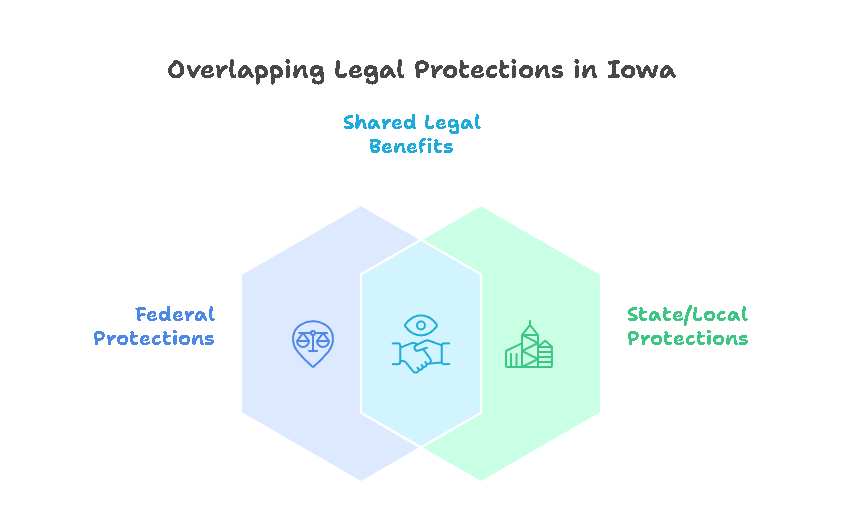
Iowa residents benefit from robust legal protections concerning criminal background checks. These include both state-specific regulations and federal laws:
- Fair Credit Reporting Act (FCRA)
This federal law ensures that consumer reports, including background checks, are accurate and used for legitimate purposes. Employers must notify individuals if adverse actions are taken based on their background checks. - Ban-The-Box Legislation
While Iowa does not have a statewide “ban-the-box” law, certain cities and employers implement policies that prohibit asking about criminal history during initial application stages. - Access Restrictions
Certain records, such as sealed or expunged cases, are not accessible through standard background checks, protecting individual privacy.
Understanding these protections empowers individuals to advocate for fair treatment during background screening processes.
How Employers Use Criminal Background Checks In Iowa
Employers in Iowa utilize criminal background checks to mitigate workplace risks, maintain compliance with industry regulations, and ensure the integrity of their workforce. However, these checks must be conducted ethically and in compliance with laws.
- Pre-Employment Screening
Employers use background checks to identify potential red flags, such as convictions for fraud, theft, or violent crimes, that may affect job performance or safety. - Compliance With Federal And State Laws
Industries such as healthcare and transportation often mandate background checks. Employers must balance compliance with regulations while respecting individual rights. - Second-Chance Hiring Initiatives
Some employers in Iowa are adopting second-chance hiring policies, which prioritize skills and qualifications over past criminal records. These initiatives help reduce discrimination and promote rehabilitation.
Properly conducted background checks foster a safer, more inclusive work environment.
PreciseHire: Your Trusted Partner In Background Screening
PreciseHire is a leading provider of criminal background check services in Iowa, offering comprehensive solutions tailored to meet diverse needs. With a commitment to accuracy, compliance, and customer satisfaction, PreciseHire delivers:
- Accurate Screening Services
Utilizing advanced technologies, PreciseHire ensures that background checks are thorough and error-free, minimizing risks for employers and organizations. - Compliance Expertise
The team at PreciseHire stays updated on the latest legal developments, helping clients navigate complex regulations like the FCRA. - Error Resolution Assistance
Inaccuracies in background checks can be costly. PreciseHire assists individuals and businesses in identifying and resolving errors efficiently. - Customized Solutions
From pre-employment screening to tenant evaluations, PreciseHire offers solutions designed to meet the specific requirements of clients.
By partnering with PreciseHire, individuals and organizations gain access to reliable, legally compliant background check services that simplify decision-making processes.
Best Practices For Preventing Errors In Background Checks
Preventing inaccuracies in criminal background checks requires proactive measures:
- Verify Information Before Submission
Ensure that names, dates of birth, and other identifying details are accurate to prevent mismatches. - Use Reliable Screening Services
Partnering with reputable providers like PreciseHire reduces the risk of errors. - Review Reports Carefully
Double-check all background check reports to identify potential inaccuracies. - Stay Updated On Legal Requirements
Regularly review changes in state and federal laws to ensure compliance during the screening process.
Implementing these practices ensures the reliability and accuracy of criminal background checks, benefiting both individuals and organizations.
Data Table: Comparison Of Name-Based Vs. Fingerprint-Based Background Checks
| Criteria | Name-Based Checks | Fingerprint-Based Checks |
|---|---|---|
| Accuracy | Moderate, prone to identity mismatches | High, based on unique biometric data |
| Processing Time | Faster, typically a few days | Slower, may take weeks |
| Cost | Generally lower | Higher due to additional processing |
| Use Cases | Standard employment or housing checks | Sensitive roles, such as law enforcement |
| Legal Requirements | Varies, often less stringent | Often mandatory for high-security roles |
This comparison highlights the importance of choosing the appropriate type of background check based on the specific needs and circumstances.
Legal Framework Surrounding Criminal Background Checks in Iowa
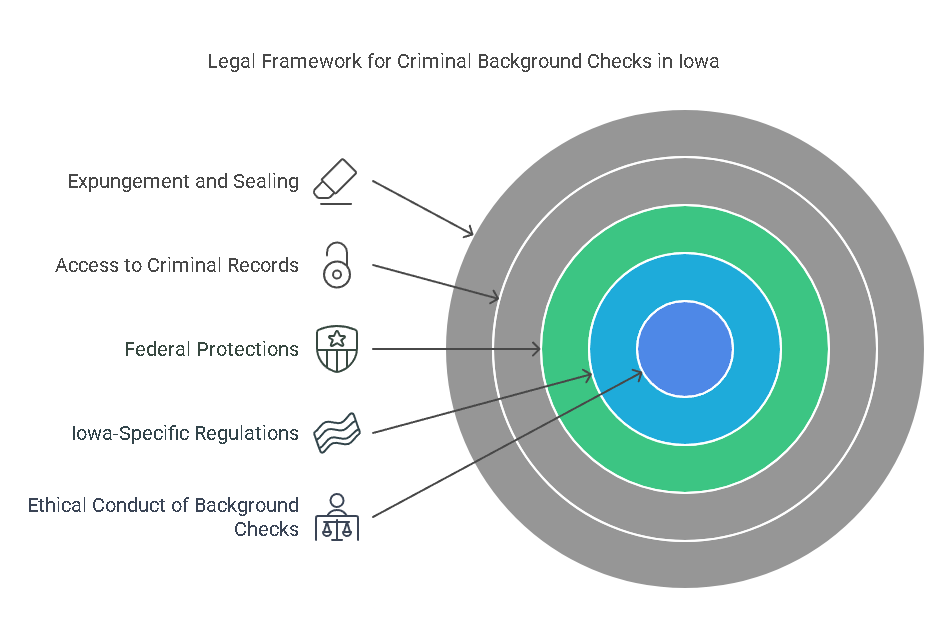
Criminal background checks are governed by a complex web of federal and state regulations designed to balance the need for public safety with individual privacy rights. In Iowa, this legal framework encompasses restrictions on what information can be accessed, by whom, and for what purposes, as well as providing protections for those subject to background checks.
Iowa-Specific Regulations on Criminal Background Checks
Iowa has specific laws that regulate criminal background checks, ensuring that they are conducted ethically and within the boundaries of privacy rights. These regulations are enforced by the Iowa Department of Public Safety (DPS) and the Iowa Division of Criminal Investigation (DCI), which provide access to criminal history information for authorized purposes.
- Access to Criminal Records
In Iowa, only individuals and organizations with a legitimate need can access criminal records. For example, employers, landlords, and government agencies may request background checks, but only under conditions that comply with state laws. The general public is not permitted to access private criminal records unless they meet these criteria. - Expungement and Sealing of Records
Certain criminal records in Iowa can be expunged or sealed, especially when the individual has completed their sentence or if they were wrongfully convicted. Expungement laws are designed to help individuals reintegrate into society without the stigma of a past conviction. However, even expunged or sealed records may be accessible in specific circumstances, such as for certain types of employment or legal proceedings. - Fair Credit Reporting Act (FCRA) Compliance
At the federal level, the Fair Credit Reporting Act (FCRA) governs how background checks are conducted. It requires that criminal background checks be accurate and used only for legitimate purposes, such as employment or housing. Additionally, the FCRA mandates that individuals be notified if an adverse action is taken against them due to information found in their background check.
Interaction Between Iowa Laws and Federal Protections
The relationship between state law and federal regulations can sometimes be complex. Iowa criminal background check laws must align with federal protections, particularly the FCRA. Here are some of the key points of interaction:
- Notification and Consent
Under the FCRA, employers must notify individuals in writing if a background check will be conducted. This notice must outline the individual’s right to obtain a copy of their report and dispute any inaccuracies. Iowa law also requires employers to obtain the individual’s consent before initiating a criminal background check. - Adverse Action Process
Both Iowa and federal laws require employers to follow a specific procedure when taking adverse action based on the results of a background check. If an employer intends to reject a candidate due to information found in the report, they must provide a pre-adverse action notice. After the individual has had the chance to review the report, the employer can then proceed with the adverse action. - Ban-the-Box Legislation
While Iowa does not have a statewide ban-the-box law, some local jurisdictions within the state have adopted policies that prohibit employers from asking about criminal history on initial job applications. This allows individuals to be evaluated based on their qualifications first, without the immediate stigma of a past conviction. Employers in these areas must ensure they comply with local ordinances when conducting background checks.
Frequently Asked Questions (FAQs)
How Can I Obtain My Own Criminal Background Check in Iowa?
In Iowa, you can obtain your own criminal background check by requesting it through the Iowa Division of Criminal Investigation (DCI). This can be done online, by mail, or in person at the DCI office. You will need to provide personal information, such as your full name, date of birth, and Social Security Number, to verify your identity. The process typically takes a few business days, although more complex checks may require additional time.
What Types of Criminal Records Are Included in an Iowa Background Check?
An Iowa criminal background check typically includes records of convictions, arrests, pending charges, warrants, and court outcomes. The types of offenses included in the report may range from misdemeanors to felonies. It’s important to note that Iowa background checks do not always include sealed or expunged records, as these are legally protected from disclosure in certain circumstances.
How Long Do Criminal Convictions Stay on Record in Iowa?
In Iowa, criminal convictions generally remain on record for life. However, certain convictions may be eligible for expungement or sealing under specific conditions, such as after a certain period has passed without further offenses or when the individual has successfully completed their sentence. For example, individuals convicted of certain minor offenses may be eligible for expungement after a set period of time.
Can An Employer in Iowa Deny Me a Job Based on My Criminal History?
Yes, an employer in Iowa can deny you a job based on your criminal history, but only if the conviction is relevant to the job. Employers are prohibited from making blanket decisions based solely on criminal records. They must take into account factors such as the nature of the offense, the time that has passed since the conviction, and its relevance to the job duties. Employers must also follow the FCRA process, providing notice and an opportunity for the applicant to dispute the background check findings.
What Should I Do If My Background Check Contains Inaccurate Information?
If your background check contains inaccurate information, you can dispute the errors with the agency that provided the report. In Iowa, this would typically be the Division of Criminal Investigation (DCI) or the reporting agency. The dispute process generally involves providing documentation, such as court records or identification verification, to prove the inaccuracy. The agency is required by law to investigate and correct errors within a specified time frame.
Conclusion
Criminal background checks in Iowa are governed by a complex array of state and federal laws that protect individuals’ rights while ensuring that employers, landlords, and other organizations can make informed decisions. Understanding the process of obtaining, correcting, and using criminal background checks is crucial for both individuals and businesses.
PreciseHire plays an essential role in helping both employers and individuals navigate these processes, ensuring that background checks are accurate, timely, and compliant with all relevant laws. With its focus on accuracy, compliance, and customer service, PreciseHire helps mitigate risks and supports fair hiring and decision-making practices. Whether you need to obtain a background check, dispute inaccuracies, or ensure compliance, PreciseHire is the trusted partner for background screening services in Iowa.
By following the guidelines outlined in this article, individuals and organizations can protect their interests, make better decisions, and contribute to a fairer, more transparent society.
